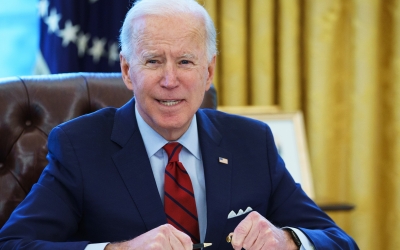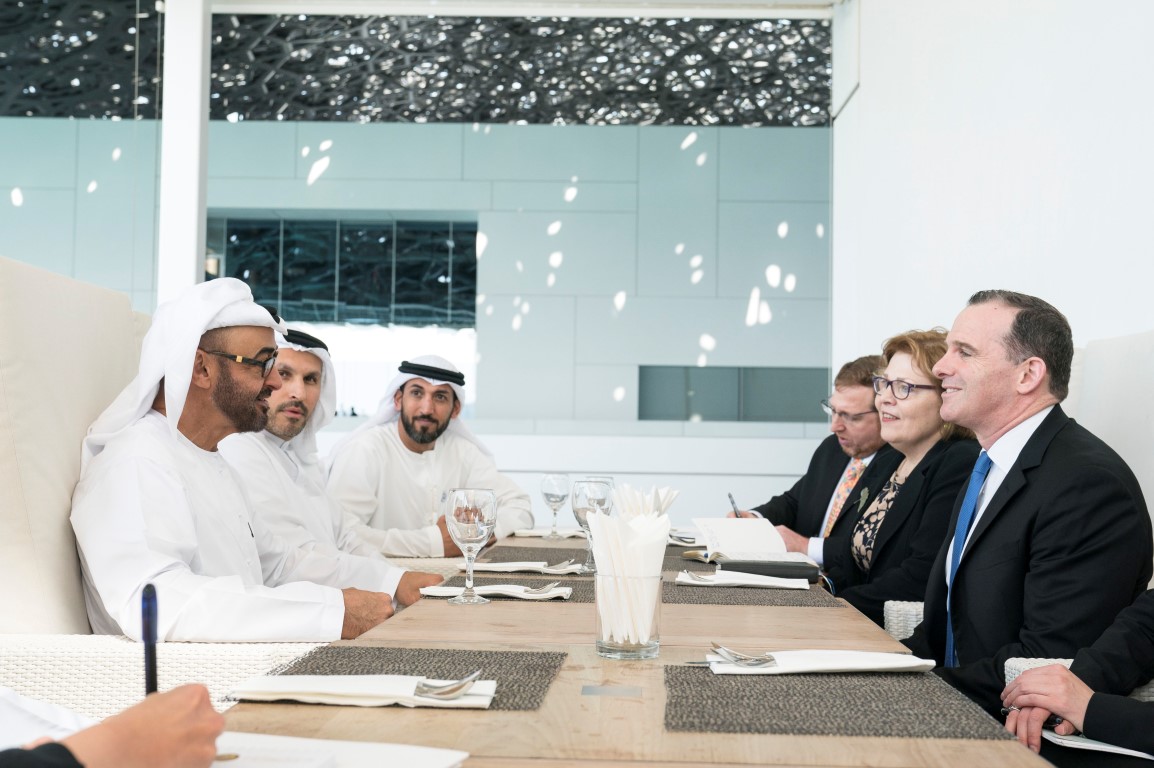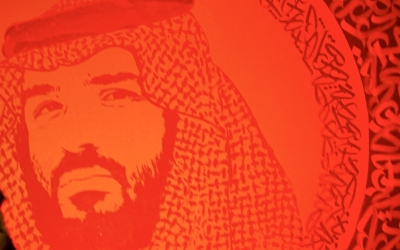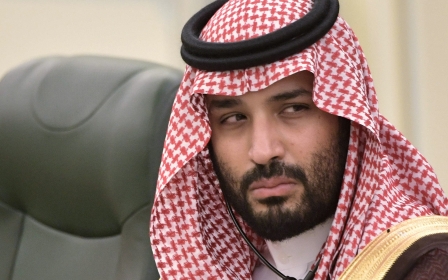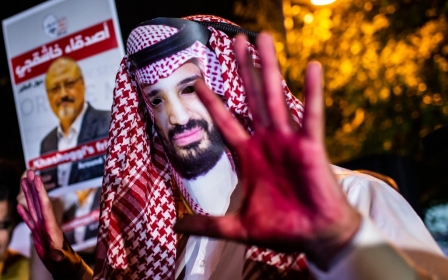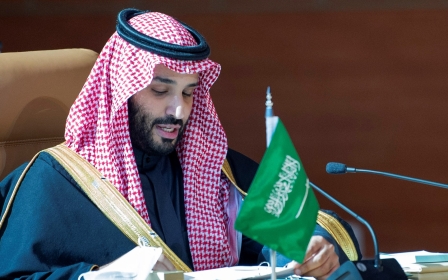All the crown prince's men
Who advised President Joe Biden that Saudi Crown Prince Mohammed bin Salman could not be sanctioned even though US intelligence had concluded that he approved the capture or killing of the dissident Saudi journalist Jamal Khashoggi?
We do not know all the actors involved in this decision, nor can we reconstruct the debate that took place, but a few pieces of the puzzle are now falling into place.
The New York Times's White House and national security correspondent David Sanger reported that the decision not to penalise the crown prince came after weeks of internal debate.
Sanger reported that Biden's newly formed national security team has advised him that "there was no way to formally bar the heir to the Saudi crown from entering the United States, or to weigh criminal charges against him, without breaching the relationship with one of America's key Arab allies".
Who are the key players in Biden's security team on the Middle East?
New MEE newsletter: Jerusalem Dispatch
Sign up to get the latest insights and analysis on Israel-Palestine, alongside Turkey Unpacked and other MEE newsletters
Biden's advisers
The first is Brett McGurk, who was named recently as the National Security Council's coordinator for the Middle East and North Africa.
McGurk is an old hand, having served under three presidents - George W Bush, Barack Obama and Donald Trump. His last job was special presidential envoy for the Global Coalition to Defeat ISIS from 2015 to 2018.
It is not too late for Biden to make the right decision. If he fails to, he will now live with the consequences. Khashoggi is not over, as Biden is just about to find out.
October 2018 was a busy time for McGurk.
He worked closely with the Saudis to influence the Iraqi elections in May 2018, and then tried, unsuccessfully, to build a coalition allied with US and Saudi interests to reinstate the prime minister Haider al-Abadi.
Just before the new government of Adil Abdul Mahdi was sworn in, McGurk flew to Riyadh. This was nine days after the 2 October 2018 murder of Khashoggi inside the Saudi consulate in Istanbul.
While his future president, Biden, was so shocked and appalled at the butchery that took place there, it was business as usual for McGurk.
During his visit, McGurk met with the then Saudi foreign minister, Adel al-Jubeir.
A week later, then-secretary of state Mike Pompeo arrived in Riyadh to discuss what was still then referred to as the disappearance of Khashoggi. Saudi Arabia was still pretending that the journalist had walked out of the consulate alive.
As Pompeo arrived, the kingdom publicly pledged $100m to support US operations in northern Syria, in what was perceived as a potential payment as Riyadh sought Trump's help in managing the blowback over allegations that Saudi agents were responsible for Khashoggi's disappearance.
McGurk was on hand to play down the linkage between Pompeo's arrival and the blood money Riyadh had just given.
"We always expected the contribution to be finalised in the fall time frame," McGurk said in a statement.
"The specific transfer of funds has been long in process and has nothing to do with other events or the secretary's visit."
Note the language McGurk used to refer to Khashoggi's killing. He called it "other events".
In any case, McGurk made no secret, at the time, of his close connections in Riyadh and in Abu Dhabi. He tweeted his meetings and boasted about them in private contacts with Iraqi politicians.
In trying to cajole Iraqi Sunni politicians to support Abadi, McGurk offered personal meetings with the Saudi crown prince.
Iraqi politician Khamis Khanjar, for years Washington's go-between with Sunni tribal leaders, recalled in an interview with MEE last year: "[McGurk] tried to entice us, promising things for us to support Abadi. Once he said to me: 'We will go, me and you, in private meets and we will meet MBS and I will push the Saudis to open up with you.'"
McGurk's warmth to the young prince was reciprocated.
MBS instructed his officials to "take care of him," a Saudi source with knowledge of the foreign contacts of MBS's inner circle told MEE.
Nor has McGurk been anything but open about his praise for the crown prince of Abu Dhabi, Mohammed bin Zayed, often known as MBZ, the Saudi prince's tutor and the author of the plan to normalise relations with Israel.
In February 2018, McGurk tweeted the following: "Detailed discussions earlier today in #AbuDhabi with HH MbZ on results of #Kuwait meetings and next phase of our @coalition campaign against #ISIS. Thanked #UAE for early and generous support for stabilization in areas liberated from #ISIS terrorists."
McGurk still praises MBZ to this day.
He told the New York Times Magazine, which published a portrait of bin Zayed, that at first he was sceptical of MBZ's intuitions about the dangers of the Muslim Brotherhood and political Islam.
"I was sceptical at first. It seemed extreme. But I've come to the conclusion that he was often more right than wrong."
McGurk has also built strong relationships with MbZ's brother Tahnoon bin Zayed, the national security adviser of the UAE, and Yousef al Otaiba, the UAE ambassador to the US. Through them, McGurk managed to get tens of millions of dollars to support the US projects in northeast Syria
Nor did McGurk's relationship with the United Arab Emirates end when he left government service over Trump's decision to withdraw troops from Syria in December 2018.
Note it was Trump - not Khashoggi's murder - that persuaded McGurk to quit government service.
In April 2020, McGurk joined Primer, a machine intelligence company headquartered in San Francisco. McGurk was described on Primer's website as an independent board director who brought "a rare breadth of experience from battlefields in the Middle East to the Oval Office, Situation Room, and negotiating tables with America's closest allies and fiercest foes".
This followed a pattern established for former members of US administrations, in which they joined companies related directly or indirectly to the UAE.
The message Biden sends to MBS is nothing short of chilling. It is this: the United States will sanction the people you ordered to murder Khashoggi, but it cannot sanction you as you are too important to us
In November 2018, Primer raised $40m from investors, which included Mubadala Investment, an Emirati sovereign wealth fund valued in 2017 as having $369.5bn in assets.
McGurk was one of four directors on the board of the company, one of whom is listed as representing Mubadala itself.
That's McGurk. But there is someone else in a key position advising the White House on security in the Middle East.
Look again at the picture McGurk tweeted of his meeting with MbZ in February 2018, and you will see, sitting to his right, Barbara Leaf.
Leaf was at the time the US ambassador to the UAE. A career diplomat, Leaf had served as a top State Department official for the Arabian peninsula and Iraq, the agency's first director of the Office of Iranian Affairs, and had served in Israel, Egypt and Tunisia.
After leaving government along with McGurk in 2018, Leaf joined the Washington Institute for Near East Policy think tank. There, her task was to "offer insights" on the US relationship with the UAE.
Leaf defended Trump's impending sale of $23bn of advanced weaponry to the UAE.
"This won't change the military balance in the Middle East," she told Vox News.
"Iran's missile and nonconventional arsenals are formidable and could wreak immense damage, even if the UAE gets the F-35."
Leaf has now joined the National Security Council as senior director for the Middle East and North Africa.
These then are the type of people who advised Biden not to sanction MBS with a visa ban. They have strong relations with the UAE, and it is noticeable that Abu Dhabi was the first to issue a statement of solidarity with the Saudis after the publication of the US intelligence report.
There were, of course, other agencies involved in the advice Biden received.
We also know that former CIA staffers, who keep in touch with the debate inside the agency and who know Saudi Arabia well, were not keen on real change in Riyadh, regarding any such move as a risky venture.
Nevertheless, the decision they collectively took and the message it sends out is a fateful one.
Biden's poisoned chalice
Trump resisted the publication of the report by the Department of National Intelligence for the very good reason that, if he published it, his administration would be forced to react to it.
The "good" Biden has now gone one step further than the "bad" Trump.
Biden published the report because he was legally obliged to do so, but has now chosen not to act on its central findings.
This does not just put him in the same place that Trump and Pompeo had arrived at. It actively ties Biden to a policy of maintaining impunity from international justice that this decision confers on the future Saudi king.
This is not a position that is necessarily stable or that is safe for any US administration to hold, even for one as cynical as the one led by Biden.
The Biden administration now faces two other lawsuits seeking information about Khashoggi's killing.
One seeks "all records relating to the killing of US resident Jamal Khashoggi". In another, the Committee to Protect Journalists seeks information and documents about what the intelligence community knew of the threat posed to Khashoggi before his murder.
Gregory Meeks, the chairman of the House Foreign Affairs Committee, released a statement that mixed praise for the release of the unclassified report with threat.
"However, given the report's conclusions about the direct role of Mohamed bin Salman, I look forward to further steps towards accountability," the statement read.
"This official US government document confirms and reiterates what previous investigations have indicated - namely his control and direct authority over the Saudi Rapid Intervention Force and related intelligence bodies mean he was indeed directly involved.
"As chairman of the House Foreign Affairs Committee, I will continue to work with the Biden administration to take further steps to ensure everyone, including those at the top, are held fully accountable, and I am reviewing further options to do so. The forced repatriation, intimidation, or killing of dissidents by the Saudi government, or any other government, must not go unchecked."
The crown prince will no doubt vary his means of conducting his terror campaign against anyone who speaks out against him, but, whatever he does, he now knows he cannot be punished because America will just not allow it
And everyone seems to be forgetting Saad al-Jabri, former major-general, minister of state and long-time adviser to the deposed Crown Prince M0hammad bin Nayef . Jabri is in hiding under round the clock protection in Toronto , having been the target of a 50-man murder team sent, he alleges, by MBS to kill him shortly after they dispatched Khashoggi.
His lawsuit against bin Salman is ongoing in a DC court. Jabri is very much alive and kicking and promises to reveal more about the crown prince's dirty operations.
With Jabri, or indeed any Saudi dissident hiding in exile, the message Biden sends to his intended killer is nothing short of chilling.
It is this: the United States will sanction the people you ordered to murder Khashoggi, but it cannot sanction you as you are too important to us.
This will embolden the murderous prince more than anything his friends in Trump or Pompeo could have done. It means he can get away with doing the same thing again and again. National security grounds were used as a get-out-of-jail card for a minor player in this saga - George Nader, the convicted paedophile. As we all know, he went on to commit more crimes and now is back in a US prison.
The crown prince will no doubt vary his means of conducting his terror campaign against anyone who speaks out against him, but, whatever he does, he now knows he cannot be punished because America - even under an administration that is hostile to him - will just not allow it.
The champagne corks must be popping in the crown prince's deserted palace in a half-built city of Neom, if alcohol is indeed the only stimulant at hand. But the message this sends about America's foreign policy in the Middle East is a calamitous one.
I wrote 10 days ago that Khashoggi would be the litmus test of Biden's commitment to run an ethical foreign policy and to promote democracy and the rule of law around the world.
On Friday he failed that test, calamitously. It is not too late for Biden to make the right decision. If he fails to, he will now live with the consequences. Khashoggi is not over, as Biden is just about to find out.
This article is available in French on Middle East Eye French edition.
Middle East Eye delivers independent and unrivalled coverage and analysis of the Middle East, North Africa and beyond. To learn more about republishing this content and the associated fees, please fill out this form. More about MEE can be found here.



